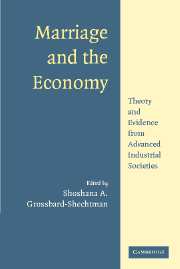Book contents
- Frontmatter
- Contents
- List of Figures
- List of Tables
- List of Contributors
- Foreword
- Acknowledgments
- Marriage and the Economy
- 1 Marriage and the Economy
- PART I THE ECONOMICS OF MARRIAGE AND DIVORCE
- 2 The Economics of Marriage and Household Formation
- 3 The Economics of Divorce
- 4 The Effects of Public Policy on Marital Status in the United States
- PART II EFFECTS OF MARRIAGE ON INCOME USES
- PART III EFFECTS OF MARRIAGE ON TIME USES
- PART IV MARRIAGE AND THE MACROECONOMY
- Index
4 - The Effects of Public Policy on Marital Status in the United States
Published online by Cambridge University Press: 07 December 2009
- Frontmatter
- Contents
- List of Figures
- List of Tables
- List of Contributors
- Foreword
- Acknowledgments
- Marriage and the Economy
- 1 Marriage and the Economy
- PART I THE ECONOMICS OF MARRIAGE AND DIVORCE
- 2 The Economics of Marriage and Household Formation
- 3 The Economics of Divorce
- 4 The Effects of Public Policy on Marital Status in the United States
- PART II EFFECTS OF MARRIAGE ON INCOME USES
- PART III EFFECTS OF MARRIAGE ON TIME USES
- PART IV MARRIAGE AND THE MACROECONOMY
- Index
Summary
Marriage is an institution that deeply affects many aspects of economic and cultural life, some of which are discussed extensively in other chapters of this book. The striking changes in marital behavior among the U.S. population have therefore launched numerous investigations into their root causes, many of which have focused upon economic factors as one type of determinant of marital decisions. Unemployment rates, female labor force opportunities, female wages, the presence of adequate “marriageable” partners, and educational attainment have all been found to play a role in explaining the trends in marital behavior.
Public policy decisions that have altered economic incentives may also have contributed to the changes that we have observed over the past three decades. Many features of public policies in the United States have implicit subsidies or penalties for marriage and divorce. In particular, government tax and transfer policies are seldom marriage-neutral; that is, the magnitude of taxes paid or transfers received may change solely because of a change in marital status. Further, legal policies that alter the relative costs or benefits of marriage also have the potential to influence marriage patterns, especially through their effects on marital dissolution. These government policies may therefore create incentives for family formation in some cases and disincentives in others. The scope of these policies may not always be deliberate but is nonetheless pervasive. The United States General Accounting Office (1996) has identified 1,049 laws at the federal level alone that may have implicit penalties or subsidies for marriage. State laws and programs can also affect marital decisions.
- Type
- Chapter
- Information
- Marriage and the EconomyTheory and Evidence from Advanced Industrial Societies, pp. 75 - 102Publisher: Cambridge University PressPrint publication year: 2003
- 2
- Cited by



